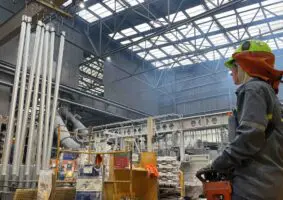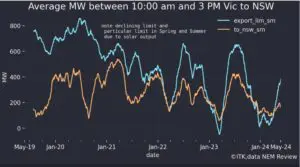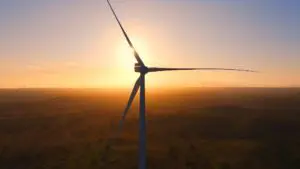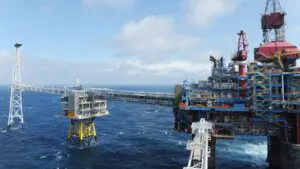The world’s largest wind turbine manufacturer, Denmark’s Vestas Wind Systems A/S, posted a surprise first-quarter loss this week, but is nevertheless hopeful it will still meet its original targets amidst what Vestas CEO Henrik Andersen describes as a potential “green recovery”.
Vestas’ announcement came at the same time that numerous major players published a joint statement highlighting the opportunity for wind energy to become a key building block for global economic recovery in the wake of the Covid-19 pandemic.
Vestas announced on Tuesday in its first quarter report for 2020 that it had posted a €54 million ($A90.6 million) loss before special items. It was the Danish wind turbine manufacturers first quarterly loss since 2013 and was set against a predicted profit of €95 million by analysts.
The company reported 3,311MW worth of new wind turbine orders across the first quarter – up from the 3,004MW taken during the first quarter of 2019 – and a wind turbine order backlog worth €15.9 billion as at the end of the quarter.
However, despite this relatively respectable first quarter performance, the company suffered from expected “increased execution costs from logistical challenges and supply chain bottlenecks, which were further amplified by the pandemic,” according to Group President & CEO Henrik Andersen.
“In the first quarter of 2020, the global demand for wind energy remained strong in spite of the COVID-19 pandemic’s continuing impact on societies and operations across all continents,” explained Andersen.
“In this environment, Vestas delivered increased revenue and order intake year on year, continued strong Service performance, and a record high order backlog of more than EUR 34bn that provides us with stability in the current period of high uncertainty.”
Vestas suspended its 2020 guidance last month and similarly announced that it would aim to lay off up to 400 of its employees due to the economic squeeze being caused by the global COVID-19 pandemic.
Importantly, however, despite having suspended their official guidance, the company is still using the guidance internally and believes it is still possible to meet its initial guidance for revenue and net income.
“Across the company, we have done well to ensure business continuity during the pandemic, but the uncertainty around the full-year impact prevails, and our guidance therefore remains suspended,” said Andersen.
“As the global pandemic and economic crisis move into their next phase, Vestas continues to ensure business continuity and that renewables become a key part in restarting the global economy.”
Separately, speaking to GTM, Andersen revealed the company is also preparing for a potential global pivot towards renewables in the wake of the pandemic, with the possibility that nations and business will look to a “green recovery” to help exit the financial crisis.
“We have not met a country where it’s not on the agenda,” Andersen said.
This same concept was expressed a day later by a group of major players in the wind energy sector, marshalled by the Global Wind Energy Council (GWEC), in a joint statement highlighting wind energy’s importance in the global economic recovery following the pandemic.
“Wind power is a key building block for economic recovery from the impact of COVID-19, which will enable governments to renew critical infrastructure for a sustainable future,” the statement reads. “The wind industry will help to deliver the jobs, clean and affordable power and energy security needed for a sustainable economic recovery.”
Signed by 13 companies and a raft of renewable energy associations from around the world, the statement serves as an important step towards global economic recovery, one in which the “wind industry is a key partner for governments, and is ready to make an important and long-lasting contribution to economic recovery.”
“The COVID-19 pandemic has had unprecedented social and economic impact around the world, and how we recover from the crisis depends on the actions that we all take over the coming months,” said Ben Backwell, CEO at GWEC. “We have the opportunity here to ‘re-build back better’, help kick-start sustainable economic recovery, and build the energy infrastructure of the future.”
“Young people in particular will bear the financial, social, health and environmental costs of the stimulus plans now being designed, and carry the debt associated with this spending, so we must make sure they are able to benefit from today’s decisions.
At the same time, governments should establish a principle of “no harm” for economic stimulus spending and ensure that this does go to reviving fossil fuel industries which need to be phased out to achieve the energy transition and head off the threat of dangerous and irreversible climate change.”
Highlighting the wind energy sector’s recent growth figures – which saw over $US652 billion ($A1.01 billion) in investments generated between 2015 and 2019 – and a possible goal of ramping wind capacity up to over 2TW by 2030 serving to create additional annual investment of $US207 billion ($A321 billion), the potential recovery role that the wind energy sector could play, amongst the renewables sector as a whole, is absolutely vital.
Conversely, the statement calls on governments to disincentivise investments in “polluting, expensive, and ageing fossil fuel assets by introducing pricing mechanisms which reflect the true economic, social, environmental, and health costs of fossil fuel generation and completely phase-out of fossil-fuel subsidies.”
“Wind energy is competitive around the world. We are not asking for a bail-out, but we do need a level playing field,” the statement continues, adding that it “is vital that governments focus public funding on assets and infrastructure that will facilitate and accelerate our transition to a low carbon future.”
“The long-term impact of COVID-19 depends on the political action we take now,” added Giles Dickson, CEO at WindEurope. “In Europe the Green Deal offers the route to economic recovery. Jobs, growth and sustainability – a clear vision for all countries to pursue.
Governments should align their recovery packages with climate goals and invest in the job-creating potential of onshore and offshore wind. Their economies will bounce back stronger and more resilient.”
The statement has been signed by the major corporates in the wind sector including Vestas, Siemens Gamesa, Iberdrola, Mingyang Smart Energy, MHI Vestas, Acciona, Nordex, ReNew Power, EDPR, ZF, Orsted, Goldwind, Envision as well as wind and renewable energy associations such as WindEurope, American Wind Energy Association (AWEA), Chinese Wind Energy Association (CWEA), Brazilian Wind Energy Association (ABEEolica), Mexican Wind Energy Association (AMDEE), RES4Africa, South African Wind Energy Association (SAWEA), Japan Wind Power Association (JWPA), Russian Association of Wind Power Industry (RAWI), Japan Renewable Energy Institute (REI), SER Colombia, Mongolian Wind Energy Association ( MONWEA), and the Turkish Wind Energy Association (TUREB/TWEA).








